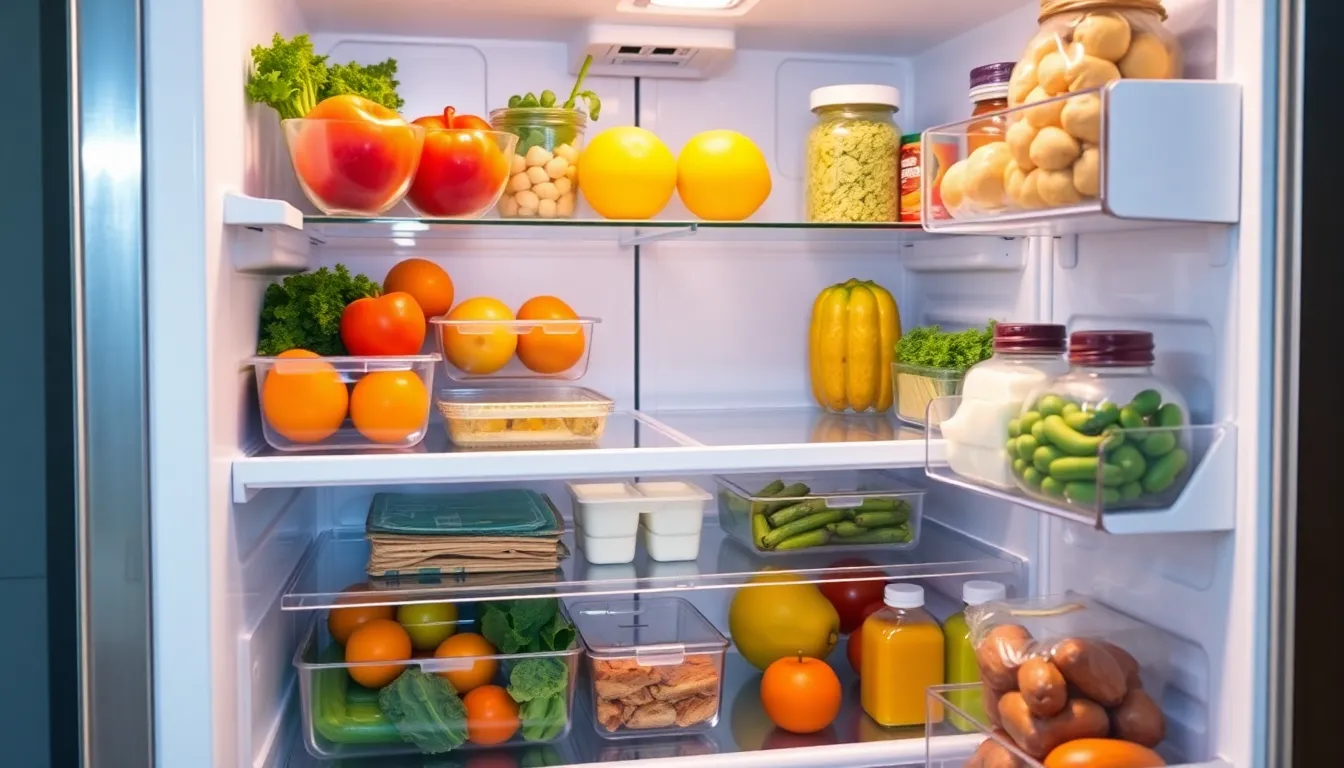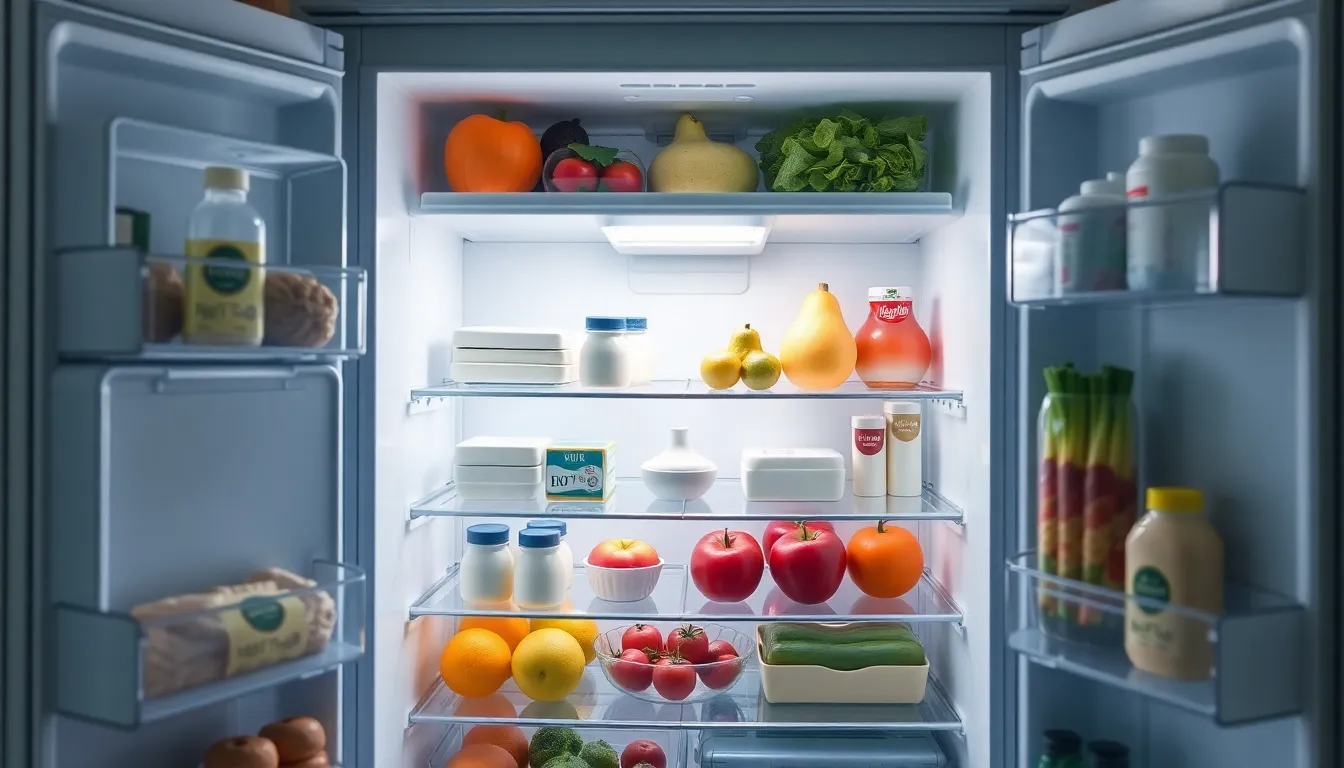Refrigerators are the unsung heroes of the kitchen, quietly working around the clock to keep food fresh and drinks cold. Yet, like any hardworking appliance, they need a little TLC to keep running smoothly. Neglecting refrigerator maintenance might lead to unexpected meltdowns—both in the appliance and your dinner plans.
Imagine opening your fridge one day to find a science experiment gone wrong instead of the leftovers you were looking forward to. Regular maintenance not only prevents these culinary disasters but also saves money on energy bills and costly repairs. So why not give your fridge the love it deserves? With a few simple tips and tricks, you can keep it humming along happily, ensuring your food stays fresh and your kitchen remains the heart of your home.
Table of Contents
ToggleImportance Of Refrigerator Maintenance
Regular refrigerator maintenance enhances efficiency and promotes longevity. Those who neglect upkeep may encounter issues that compromise food quality and inflate energy bills.
Energy Efficiency
Energy efficiency plays a crucial role in operating costs. A well-maintained refrigerator consumes less energy, contributing to lower monthly utility bills. Dust accumulation on coils can hinder performance, increasing energy use. Keeping the coils clean ensures optimal airflow and efficient cooling. Regular defrosting and temperature checks can further promote efficiency. An ideal refrigerator temperature ranges from 37°F to 40°F. Maintenance routines can significantly impact overall energy consumption.
Food Safety
Food safety hinges on proper refrigerator care. Ensuring the appliance maintains appropriate temperatures prevents harmful bacterial growth. The USDA recommends keeping food at or below 40°F to minimize spoilage risks. Using thermometers in refrigerators helps monitor internal temperatures accurately. Cleaning spills promptly helps maintain surfaces and prevents cross-contamination. Regularly checking expiration dates fosters better food management. Well-maintained refrigerators not only extend food freshness but also protect against foodborne illnesses.
Common Refrigerator Issues


Refrigerators often encounter common problems that can affect performance and efficiency. Understanding these issues helps maintain optimal functionality.
Temperature Fluctuations
Temperature fluctuations in refrigerators can lead to food spoilage. When the internal temperature rises above 40°F, bacteria thrive, endangering food safety. A faulty thermostat may contribute to these fluctuations. Regular checks on the thermostat settings help ensure accurate readings. Clogged vents also inhibit proper air circulation, causing inconsistent temperatures. Regularly cleaning vents aids in maintaining even temperature distribution. Finally, worn-out door seals let warm air enter, also causing fluctuations. Inspecting seals for cracks or damage allows for timely replacements.
Noisy Operation
Noisy operation often signals underlying problems. Vibrations or rattling sounds could indicate loose components or an unbalanced refrigerator. Inspecting the level of the appliance ensures stable placement. Fans may also generate noise. A faulty evaporator fan can disrupt quiet operation. Listening for unusual sounds during operation helps identify fan issues. Additionally, ice build-up in the freezer section may obstruct airflow, leading to loud noises. Regular defrosting prevents ice accumulation. Lastly, compressor noises may indicate a malfunction. Consulting a professional for compressor issues ensures proper diagnostics and repairs.
Essential Maintenance Tips
Regular maintenance ensures the refrigerator operates efficiently. Simple tasks contribute to food safety and energy savings.
Regular Cleaning
Dust buildup on coils reduces efficiency. Clean condenser coils every six months to enhance performance. Vacuum or brush away dirt to promote airflow. Wipe down shelves and surfaces regularly to prevent spills from accumulating. Utilize warm soapy water for cleaning interior surfaces, avoiding strong chemicals. Clear out expired items to maintain organization and freshness. Clean the drip pan to prevent mold and odors. Following these steps keeps the refrigerator running smoothly and prevents unexpected issues.
Checking Seals and Gaskets
Faulty seals lead to temperature fluctuations. Inspect door seals regularly for any tears or cracks. Clean these gaskets with warm soapy water to maintain a tight seal. A proper connection keeps cold air in and warm air out. Replace worn seals to reduce energy consumption. Use a dollar bill test; if it slips out easily when closing the door, consider seal replacement. Checking these components enhances cooling performance and prolongs refrigerator life.
Troubleshooting Common Problems
Troubleshooting a refrigerator’s common issues contributes to maintaining efficiency and performance.
Diagnosing Temperature Issues
Diagnosing temperature problems starts with checking the thermostat settings. Ensure the thermostat reading matches the actual temperature inside. Next, inspect the door seals; leaks can lead to temperature fluctuations. If seals are damaged, cold air escapes, affecting internal temperatures. Additionally, clean the condenser coils regularly, as dirt buildup impedes airflow and cooling. Blocked vents can also prevent proper circulation; ensure vents remain unobstructed. Observing these components helps maintain consistent and safe temperatures, ensuring food quality.
Fixing Noisy Compressors
Fixing a noisy compressor often begins with identifying the source of the sound. Loose components can cause rattling noises; tighten any screws or brackets that are not secure. Compressor vibrations can also create noise; adding rubber pads under the refrigerator might reduce this issue. Accumulated dust on the compressor may contribute to noise levels; regular cleaning is necessary for optimal operation. In some cases, ice buildup around the compressor can exacerbate sounds, so defrosting may be needed. Addressing these factors helps reduce noise and improves refrigerator performance.
Professional Maintenance Services
Professional maintenance services can significantly enhance refrigerator performance. Experts possess the tools and knowledge necessary to identify and address issues that regular users might overlook.
When To Call A Technician
Identifying the right time to call a technician is crucial for refrigerator upkeep. If the appliance emits unusual noises, it may indicate a malfunction that requires professional attention. Temperature inconsistencies also signal potential problems; when items freeze or don’t stay cold, a technician’s expertise should be sought. Persistent leaks around the refrigerator warrant immediate evaluation, as they can lead to more significant damage. Additionally, if the energy bill spikes unexpectedly, it could reflect underlying efficiency issues that professionals can diagnose.
Cost Considerations
Considering the costs associated with professional services is important. Repair expenses typically range from $100 to $400, depending on labor and parts needed. Routine maintenance checks usually cost between $75 and $150, making them a worthwhile investment for long-term savings. Evaluating warranty coverage can also provide insights; many provide free or discounted repair services. Balancing repair costs with potential food spoilage and energy wastes helps determine the best course of action. Prioritizing timely maintenance can prevent much more expensive repairs, helping maintain the appliance’s longevity and efficiency.


